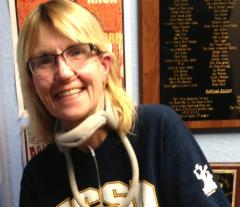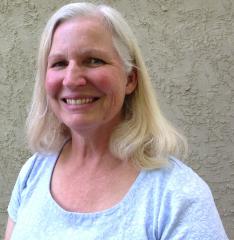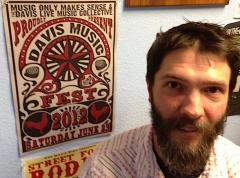 In June 2009, as they graduated from Davis High School, Lauren De Terra (left) and Megan Buchanan discussed growing up in Davis on Davisville. Four years later, after living in Sacramento and San Francisco respectively, and with college done or nearly done, the longtime friends discuss how they view Davis now.
In June 2009, as they graduated from Davis High School, Lauren De Terra (left) and Megan Buchanan discussed growing up in Davis on Davisville. Four years later, after living in Sacramento and San Francisco respectively, and with college done or nearly done, the longtime friends discuss how they view Davis now.
|
 Cathy Speck is a native daughter of Davis, a musician, an athlete, a longtime employee of the Davis Food Co-op--and she is dying of ALS. She writes a blog, “Cathy Speck’s Dying as Living.” We talk about her experience today, on Davisville.
Cathy Speck is a native daughter of Davis, a musician, an athlete, a longtime employee of the Davis Food Co-op--and she is dying of ALS. She writes a blog, “Cathy Speck’s Dying as Living.” We talk about her experience today, on Davisville.
|
 “Your Ideal Cat” is a human-feline matchmaker guidebook, filled with information about different breeds to help people who want a cat (including tabbies like these two) to find the right one. You require affection? The laid-back Ragdoll is deeply friendly. For a more tiger-like feline, consider the Bengal, although it might turn your furniture into an urban forest. Drs. Benjamin and Lynette Hart, professors of veterinary medicine at UC Davis, wrote “Your Ideal Cat.” On today’s show we discuss the book, breeds, purring as exercise (to the cat, it is), and whether Davis is more of a cat town, or a dog town.
“Your Ideal Cat” is a human-feline matchmaker guidebook, filled with information about different breeds to help people who want a cat (including tabbies like these two) to find the right one. You require affection? The laid-back Ragdoll is deeply friendly. For a more tiger-like feline, consider the Bengal, although it might turn your furniture into an urban forest. Drs. Benjamin and Lynette Hart, professors of veterinary medicine at UC Davis, wrote “Your Ideal Cat.” On today’s show we discuss the book, breeds, purring as exercise (to the cat, it is), and whether Davis is more of a cat town, or a dog town.
|
 Pinball’s pop-culture glory era has yielded to computer games and the likes of Angry Birds, but the silver ball still has fans. One of the biggest has to be Steve Faith of Davis, an educational technology instructor who is helping to organize the 2013 Pin-a-Go-Go show May 17-19 at the May Fairgrounds in Dixon. It will have more than 100 machines ready for play. On today’s Davisville we talk about the appeal of the noisy, ringing, electromechanical games. Few remain in Davis, but Faith tells us where to find them. Pinball’s pop-culture glory era has yielded to computer games and the likes of Angry Birds, but the silver ball still has fans. One of the biggest has to be Steve Faith of Davis, an educational technology instructor who is helping to organize the 2013 Pin-a-Go-Go show May 17-19 at the May Fairgrounds in Dixon. It will have more than 100 machines ready for play. On today’s Davisville we talk about the appeal of the noisy, ringing, electromechanical games. Few remain in Davis, but Faith tells us where to find them.
|
 Today’s Davisville interviews Mary Lou Rossetto, the new director of Grace in Action, a Christian, Davis-based service for the homeless that began in 1999. We talk about the organization and its activities, plus the number of local homeless, what they need, what Davis could do for them, what they could do for themselves, the limits of mental health laws, and more. Rossetto, formerly an elementary school teacher, has lived in Davis since 1976.
Today’s Davisville interviews Mary Lou Rossetto, the new director of Grace in Action, a Christian, Davis-based service for the homeless that began in 1999. We talk about the organization and its activities, plus the number of local homeless, what they need, what Davis could do for them, what they could do for themselves, the limits of mental health laws, and more. Rossetto, formerly an elementary school teacher, has lived in Davis since 1976.
|
How would you finish that sentence? UC Davis student Henry Lam wants to know—specifically, he invites you to write your answer on a chalkboard wall outside the Memorial Union April 3 or 4. It’s all part of a larger strategy. We discuss the project on today’s Davisville, as well as a half-dozen other campus projects he is part of, including the UC Davis Film Festival, the UC Davis Vietnamese Student organization, and last year’s Davis in a Day movie. Find updates on the event at http://ucdbeforeigrad.tumblr.com
|
|
|

This show discusses live music in Davis, including the possibility of adding a permanent venue downtown, with Kyle Monhollen of the Davis Live Music Collective.
|
 At the end of 2012, Davis Vanguard owner David Greenwald wrote and posted an essay about “the other Davis,” or the aspects of our town not necessarily reflected in Davis’ college-educated, affluent image. On today’s Davisville we talk about what he means, as well as the nearly 7-year-old Vanguard itself, which he says has about 6,000 core readers and took in about $50,000 last year.
At the end of 2012, Davis Vanguard owner David Greenwald wrote and posted an essay about “the other Davis,” or the aspects of our town not necessarily reflected in Davis’ college-educated, affluent image. On today’s Davisville we talk about what he means, as well as the nearly 7-year-old Vanguard itself, which he says has about 6,000 core readers and took in about $50,000 last year.
|
This is the second halfof an interview with Davis' newest City Council members, Lucas Frerichs and Brett Lee, who took office last summer. Find part 1 at http://www.kdrt.org/node/11291.
|
 In June 2009, as they graduated from Davis High School, Lauren De Terra (left) and Megan Buchanan discussed growing up in Davis on Davisville. Four years later, after living in Sacramento and San Francisco respectively, and with college done or nearly done, the longtime friends discuss how they view Davis now.
In June 2009, as they graduated from Davis High School, Lauren De Terra (left) and Megan Buchanan discussed growing up in Davis on Davisville. Four years later, after living in Sacramento and San Francisco respectively, and with college done or nearly done, the longtime friends discuss how they view Davis now.


 Pinball’s pop-culture glory era has yielded to computer games and the likes of Angry Birds, but the silver ball still has fans. One of the biggest has to be Steve Faith of Davis, an educational technology instructor who is helping to organize the 2013 Pin-a-Go-Go show May 17-19 at the May Fairgrounds in Dixon. It will have more than 100 machines ready for play. On today’s Davisville we talk about the appeal of the noisy, ringing, electromechanical games. Few remain in Davis, but Faith tells us where to find them.
Pinball’s pop-culture glory era has yielded to computer games and the likes of Angry Birds, but the silver ball still has fans. One of the biggest has to be Steve Faith of Davis, an educational technology instructor who is helping to organize the 2013 Pin-a-Go-Go show May 17-19 at the May Fairgrounds in Dixon. It will have more than 100 machines ready for play. On today’s Davisville we talk about the appeal of the noisy, ringing, electromechanical games. Few remain in Davis, but Faith tells us where to find them.

